中职英语基础模块修订版(上)unit3教材课件.
中职英语基础模块上册课文ppt详解.
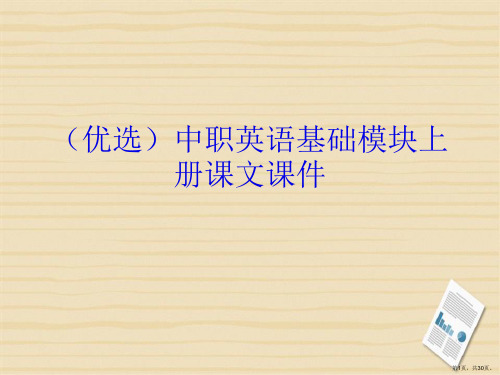
I led my new classmate to our classroom
be the same as…与…相同(一样)
例如:
Your classroom is the same as ours. 你们的教室和我们的一样。
第18页,共30页。
even if: “即使、虽然”,引导让步状语从句
一天天过去了,终于男孩能够告诉爸爸他把所有的钉子拔完了。爸 爸拉着他的手来到篱笆前,让他看篱笆上留下的洞,并和他说:你 看看这些洞,篱笆墙还能回到原来的样子吗?当你在发脾气时说的 话,留在人们心里的伤痕就像这些洞一样,即使你说了了对不起, 伤痕也永远留在了那里,朋友就是最珍贵的珠宝,他们能让你开心 地微笑,让你感到快乐,所以绝不要伤害他们。
例如: The question is not difficult at all. 这个问题一点也不难。 Translate:我一点也不喜欢他。 I don’t like him at all.
第15页,共30页。
• ask sb to do sth: 请求某人做某事 • 例如:
• He asks me to lend him some money. • 他请求我借点钱给他。 • pull out: 拔…出来; 拖出去 • 例如: • He pulled out the dog. • 他把狗拖出去。 • be able to: 能够做.. • 例如: • The boy is able to sing English songs. • 这个男孩会唱英文歌。
6. in anger 7. even if
8. make sb. do sth.
9. since then
外研社中职英语基础模块修订版PPT UNIT3
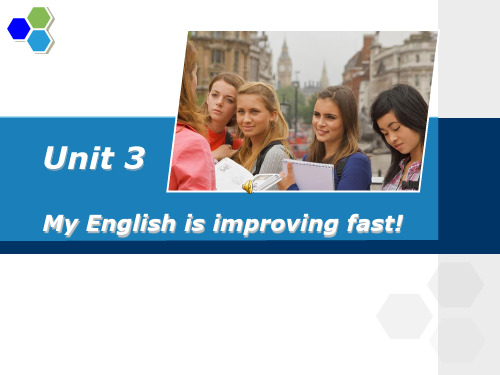
shaking the head是动名词短语,在该句中作主语。
Reading and Writing
5 Discuss and fill.
含义,并填表。 1. In India, it means “agree with others”. 2. In many other countries, it means “disagree” or “no”. 1. In the US, it means “OK”. 2. In Latin America, it‟s rude. 3. In Japan, it means “money”. 讨论以下身势语在不同文化中的
sound是感官动词,后加形容词,其他感官动词 还有feel,taste,smell, look等。
Listening and Speaking
5 Listen again and compare.
学习方法。 再听录音,比较英语
Leo
listen to English radio programmes read English news browse English learning websites keep a diary in English
听录音,学习下列词语。
v. 似乎,好像 申请 adj. 国际的 n. 必须做的事 n. 运气 试一试
international
must luck give it a try
Listening and Speaking
2 Listen and practice. 听录音,讨论工作对英语的要求。
Bill: Hi, Sarah. You seem to be spending a lot of time studying English these days. Sarah: That‟s true, but I have to. Bill: Why is that? Sarah: Because I‟ve applied for a job in a big international company. Bill: What‟s the job you‟ve applied for? Sarah: Secretary. Bill: Is English a must for the job? Sarah: Yes. I‟ll have to use a lot of English if I get the job. Bill: Wish you good luck.
外研中职国规英语教材基础模块(修订版)第一册unit3Ilikeplayingbadminton
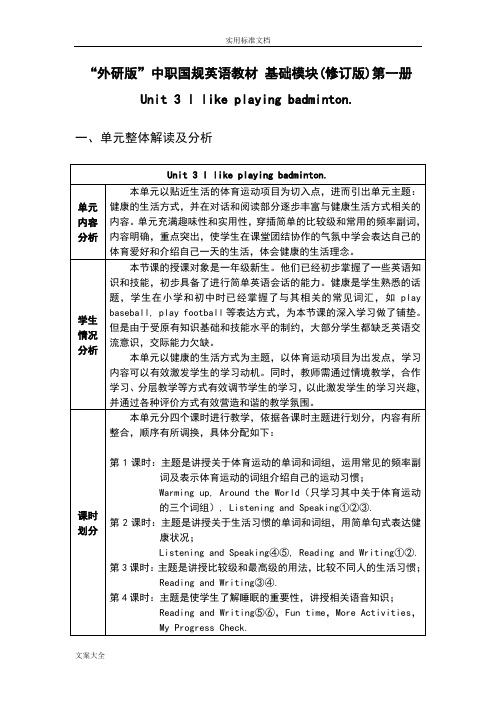
“外研版”中职国规英语教材基础模块(修订版)第一册Unit 3 I like playing badminton.一、单元整体解读及分析Unit 3 I like playing badminton.单元内容分析本单元以贴近生活的体育运动项目为切入点,进而引出单元主题:健康的生活方式,并在对话和阅读部分逐步丰富与健康生活方式相关的内容。
单元充满趣味性和实用性,穿插简单的比较级和常用的频率副词,内容明确,重点突出,使学生在课堂团结协作的气氛中学会表达自己的体育爱好和介绍自己一天的生活,体会健康的生活理念。
学生情况分析本节课的授课对象是一年级新生。
他们已经初步掌握了一些英语知识和技能,初步具备了进行简单英语会话的能力。
健康是学生熟悉的话题,学生在小学和初中时已经掌握了与其相关的常见词汇,如play baseball, play football等表达方式,为本节课的深入学习做了铺垫。
但是由于受原有知识基础和技能水平的制约,大部分学生都缺乏英语交流意识,交际能力欠缺。
本单元以健康的生活方式为主题,以体育运动项目为出发点,学习内容可以有效激发学生的学习动机。
同时,教师需通过情境教学,合作学习、分层教学等方式有效调节学生的学习,以此激发学生的学习兴趣,并通过各种评价方式有效营造和谐的教学氛围。
课时划分本单元分四个课时进行教学,依据各课时主题进行划分,内容有所整合,顺序有所调换,具体分配如下:第1课时:主题是讲授关于体育运动的单词和词组,运用常见的频率副词及表示体育运动的词组介绍自己的运动习惯;Warming up, Around the World(只学习其中关于体育运动的三个词组), Listening and Speaking①②③.第2课时:主题是讲授关于生活习惯的单词和词组,用简单句式表达健康状况;Listening and Speaking④⑤, Reading and Writing①②. 第3课时:主题是讲授比较级和最高级的用法,比较不同人的生活习惯; Reading and Writing③④.第4课时:主题是使学生了解睡眠的重要性,讲授相关语音知识;Reading and Writing⑤⑥,Fun time,More Activities,My Progress Check.二、分课时教学设计第1课时教学目标语言知识目标:能够初步掌握常用频率副词,如always, often,sometimes, never, usually等的用法。
中职英语基础模块上册unit ppt课件
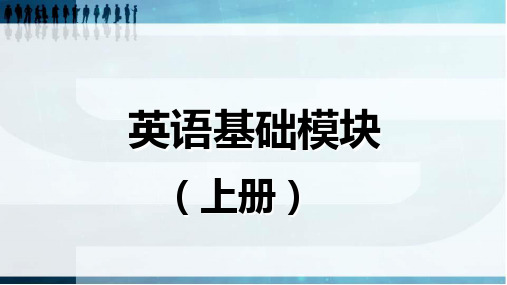
Kissing hands
吻手礼:吻手礼源于古代维京人用手向其日耳曼君 主递礼物的风俗,流行于欧美上层社会,是一种仅对贵 族已婚妇女实施的礼节。吻手礼一般在室内举行,并且 仅限于手腕以下部位,一般是指背。
cross one's
hands 双手合十:
这种礼仪多见于 信奉佛教的国家,比如说泰国。 泰国人见面时往往低头问候, 并将双手合十于胸前。小辈见 长辈双手举到前额高度,平辈 到鼻子高度,而长辈还礼则只 需到胸前即可。另外,泰国认 为头部是神圣的,不能随意摸 别人的头。
你呢
I'm fine,too.Tha
nk you! 我也是,谢谢
LOREM IPSUM DOLOR
Nice to meet you! 很高兴见到你 Nice to meet you,too! 也很高兴见到你
• Notes:
•
• 1. Introductions are important because a proper introduction will leave a good first impression upon others.
•.
Warm-up
Look at the picture and tick. Emily and Jenny meet each other for the first time. Tick what they would say.
( ) 1. Hi, Jenny! ( ) 2. Good morning Jenny. Nice to meet you. ( ) 3. Hello, I’m Emily. ( ) 4. Bye. See you later. ( ) 5. How do you do? ( ) 6. Thank you!
中职英语基础模块修订版(上)unit3
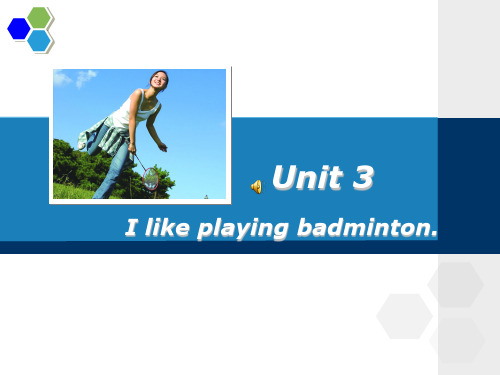
萨姆:玛丽。我表姐。
Listening and Speaking
3 Listen again and act. 再听录音,根据提示表演对话。
S1: What do you usually do after school, Amy? S2: I usually do shopping with
听录音,补充萨姆周末一天活动的信息。
have breakfast
have dancing classes
have lunch
play ping-pong
take a walk take a nap watch TV
Listening and Speaking
5 Read and discuss.
根据示例谈论萨姆的活动。
Amy: Who do you often play with?
Sam: Mary, my cousin.
参考译文
tennis:网球; table tennis:乒乓球,对话中用的ping-pong是同样的 意思。
萨姆:埃米,你放学后通常做什么? 埃米:我经常和我姐姐打网球。好玩儿极了。
萨姆:真好!不过我喜欢打乒乓球。
睡眠对我们的健康非常重要。它有助于我们保持健康 的体魄,提高记忆力。睡眠甚至可以帮助我们减轻压力和 减肥。良好的夜间睡眠会让我们感觉神清气爽。睡眠对青 少年尤其重要。睡眠可使他们长得更高、更强壮。所以, 青少年每天至少要睡八个小时。他们应该早睡早起。青少 年要想保持身体健康,每天必须有充足的睡眠。
Unit 3
I like playing badminton.
Look at the picture and discuss:
1. Which sport is she playing? 2. What sports do you like playing?
高教版中职英语(基础模块 第1册)Unit 3《How much is it》ppt课件1

Speaking and Acting (work in pairs)
• Divide all students into some groups and Show two pictures to make a new dialogue with some shopping
language .
Extending
¥
Signature
Tanuantity
Unit Price
Total amount Signature
¥ Tang Hua
Reading
1. Let students open the book and read the dialogue B twice to check the answers above listening . 2. Explanation ( language points )
Exercises
• 1. Would you like (play) the basketball ? • 2. How much (be) the shoes ? • 3. There (be) some water on the ground . • 4. There is a bird (fly) in the sky . • 5. Tom wants (be) a teacher in the future .
Iistening
• Show a recepit and let students to fill it. When students listen to the tape ,the first time they can only listen ,The second time they can listen and fill in it .
中职英语3(基础模块)Unit3课件
Are teachers there qualified?
Is the tuition fee expensive?
How to register?
Listen and decide.
Do they offer the course I want to learn?
Can I get a certificate?
□ Language □ Computer
□ Full-time □ Part-time
□ Fax
□ Online
Listen and underline.
Sally: Good morning. This is Jinghai Training School. What Can I do for you?
development in this field. Sally: Good! Will I get a certificate after the program? David: Sure. Sally: Are there any part-time courses?
Yes. We have both night and weekend courses for those who have to work at daytime. David: How do I sign up? Sally: You can find our homepage on the Internet and fill in the application form online. David: Great! It is good news to me that I can register online. Thank you very much. Sally: You are welcome!
中职英语基础模块上册unit课文 ppt课件
He often fights with his younger sister.
他经常和他妹妹打架。
• give sb. sth: 给某人某物
• 例如: • He gave me a birthday present. • 他给我一个生日礼物。
ppt课件
8
• a bag of: 一包,一袋;
He asked him to pull out one nail each
time when he keep his temper.
ppt课件
24
7) Did the boy pull out all the nails?
Yes ,he did.
8)Then what did his father told the boy?
classmates and frieppnt课件ds.
25
三:Summary(概括 )
fight with others
lose his temper
hammer a nail
keep his temper
pull the nail
get on well with others
ppt课件
26
四.What we should do
• 例如:abowl of; a cup of; a handful of; an armful of;
• He gave me a bag of apples.
• 他给我一袋苹果。
• tell sb to do sth: 告诉某人去做某
事
• 例如:
• Tell him to wait me for a while.
• lead sb to ---
中职教育-英语(基础模块)上册第三章 Unit3 :Can you dance and sing.ppt
动 词
2) 表示主观上的允许、许可(此时可以与 may 通用,could 更为委婉)
Can I ask you some questions about it? 我可以问你有关这件事的 几个问题吗? Could I be forgiven my negligence? 请原谅我的疏忽,行吗?
3) 表示客观上的可能性
Application for Employment (Sara Smith)
➢ 阅读萨拉·史密斯的求 职表,回答下列问题。
1) How old is Sally? 2) What can Sally do? 3) What position does Sally want to apply for? 4) What’s Sally’s email address?
1. count to___________ 2. 3. 4. 5.
Things I can’t do in English
1. tell jokes___________ 2. 3. 4. 5.
16
过渡页
TRANSITION PAGE
Part 5 Grammar Foucus
Notes
can为情态动词,其否定形式为can’t(也可以写成can not),使用时不随人称变化而
Unit 3 Can you dance and sing?
才艺
目录页
CONTENTS PAGE
Part 1 Part 2 Part 3 Part 4 Part 5 Part 6 Part 7
Warm up Listening and Speaking
Pronunciation Reading and Writing
高教版中职英语(基础模块 第1册)Unit 3《How much is it》ppt课件3
词语汉译英 1. 讲英语 2. 发电子邮件 3. 修理电脑 4. 开车 5. 教英语 6. 接待来客 7. 唱歌 8. 打篮球 9. 骑自行车 10.用英语读和写
Key sentences
What can I do for you?
May I help you? Can I help you?
How much is it
……多少钱?
How much is the dress?
How much…are the shoes?
Do exercise
___H___o_w___m__u__c_hthise hat?
Ice Cream Original ¥ 2.80 Wednesday ¥ 2.50
Apple Original ¥ 5.99 Wednesday ¥ 5.69
Pear Original ¥ 3.60 Tuesday ¥ 3.40
Chicken Original ¥ 10.00 Thursday ¥ 9.60
supermarket
购物中心,出现于20世
department store
4
5 drugstore
6
4
6
纪初3 ,五六十年代开始 在美国等发达国家盛行。 它集购物、餐饮、休闲、 娱乐为一体。
2. Look and fill.
grocery bookstore
__2_,_3_, 4__ _ 5, 6
- 1、下载文档前请自行甄别文档内容的完整性,平台不提供额外的编辑、内容补充、找答案等附加服务。
- 2、"仅部分预览"的文档,不可在线预览部分如存在完整性等问题,可反馈申请退款(可完整预览的文档不适用该条件!)。
- 3、如文档侵犯您的权益,请联系客服反馈,我们会尽快为您处理(人工客服工作时间:9:00-18:30)。
I like playing badminton.
Look at the picture and discuss:
1. Which sport is she playing? 2. What sports do you like playing?
You’ll be able to:
1. describe a healthy lifestyle; 2. talk about sports.
Listening and Speaking
5 Read and discuss. 根据示例谈论萨姆的活动。
What is Sam doing at 12:00 at noon? He is having lunch.
Listening and Speaking
5 Read and discuss. 根据示例谈论萨姆的活动。
该句是现在进行时态,表示在说话的时候或现 阶段正在发生的动作或情况。
Listening and Speaking
5 Read and discuss. 根据示例谈论萨姆的活动。
What is Sam doing at 10:00 in the morning? He is having dancing classes.
take a walk
play ping-pong watch TV
take a nap
Listening and Speaking
5 Read and discuss. 根据示例谈论萨姆的活动。
What is Sam doing at 8:00 in the morning? He is having breakfast.
迈克打算这周末去徒步旅行。
2. Kate goes jogging every morning.
凯特每天早上慢跑。
Warming up
2 Look and tick. 看图,选出有益于健康的活动和习惯。
√ go dancing
√ ride a bike
√ eat fast food √ watch TV
参考译文
tennis:网球;
table tennis:乒乓球,对话中用的ping-pong是同样的 意思。
萨姆:埃米,你放学后通常做什么? 埃米:我经常和我姐姐打网球。好玩儿极了。 萨姆:真好!不过我喜欢打乒乓球。 埃米:和谁打呢? 萨姆:玛丽。我表姐。
Listening and Speaking
3 Listen again and act. 再听录音,根据提示表演对话。
do shopping do reading
S1: What do you usually do after school, Amy?
S2: I usually do shopping with my sisteut I like doing reading.
S2: Who do you often read with? S1: Mary, my cousin.
Listening and Speaking
3 Listen again and act. 再听录音,根据提示表演对话。
play basketball play football
S1: What do you usually do after school, George?
S2: I usually play basketball with my brother. It’s a lot of fun.
S1: Great! But I like playing football.
Listening and Speaking
1 Listen and learn. 听录音,学习下列词语。
play tennis 打网球 take a nap 打盹儿 take a walk 散步 play ping-pong 打乒乓球
Listening and Speaking
2 Listen and practice. 听录音,练习谈论课后活动。
Sam: What do you usually do after school, Amy? Amy: I usually play tennis with my sister. It’s a lot of fun. Sam: Great! But I like playing ping-pong. Amy: Who do you often play with? Sam: Mary, my cousin.
去徒步旅行
Warming up
go swimming
去游泳
Warming up
play badminton
打羽毛球
Warming up
play basketball
打篮球
Warming up
play ping-pong
打乒乓球
Warming up
go jogging
慢跑
1. Mike plans to go hiking this weekend.
Warming up
1 Listen and match. 听录音,将下列词语与图片匹配。
go hiking
go swimming
play badminton
play basketball
play ping-pong
go jogging
Key sentences:
Warming up
go hiking
What is Sam doing at 1:00 in the afternoon? He is taking a nap.
Listening and Speaking
5 Read and discuss. 根据示例谈论萨姆的活动。
What is Sam doing at 3:00 in the afternoon? He is playing ping-pong.
S2: Who do you often play with? S1: My classmates.
Listening and Speaking
4 Listen and fill. 听录音,补充萨姆周末一天活动的信息。
have breakfast
have dancing classes
have lunch
